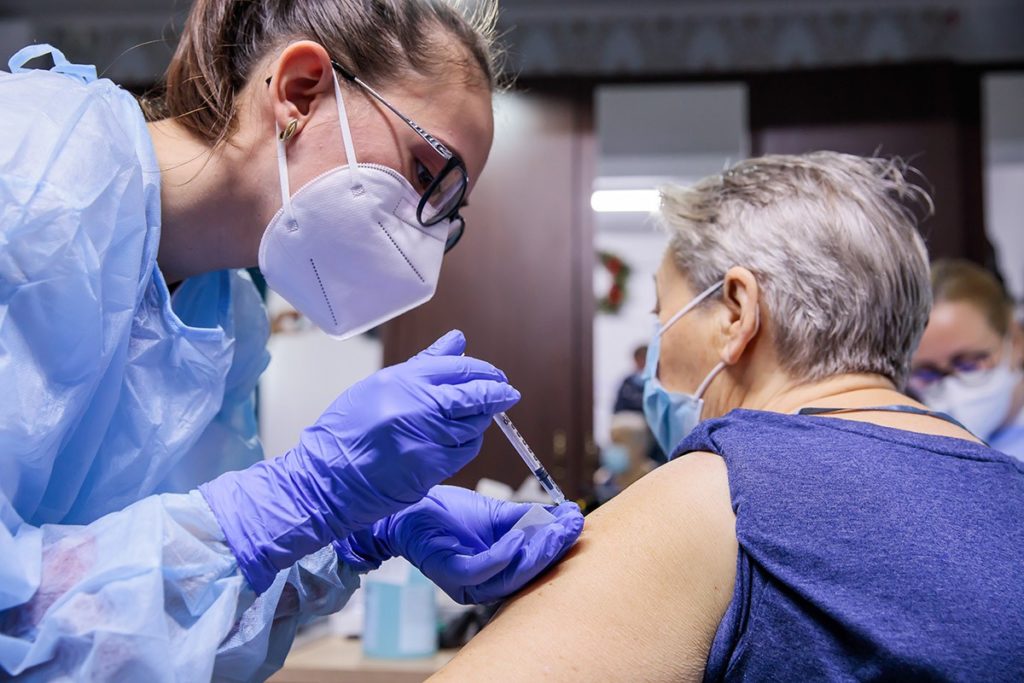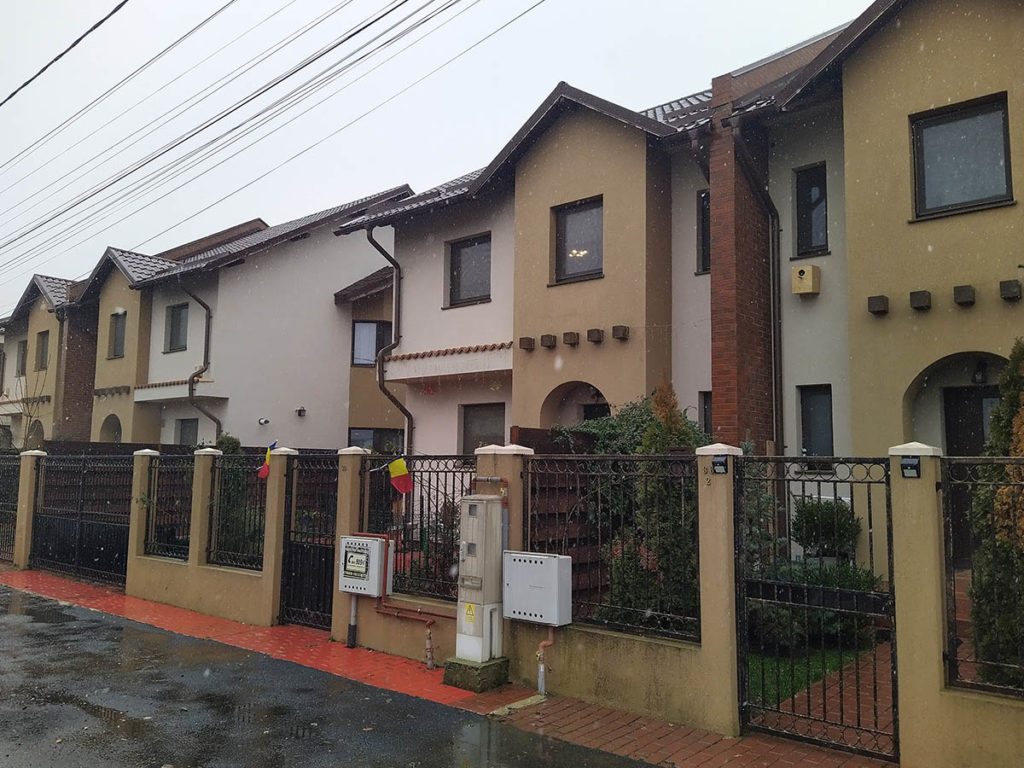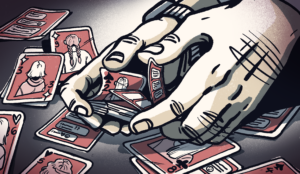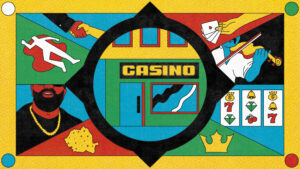The urgency. The delivery of syringes for the national vaccination campaign against COVID-19 was delayed by more than 2 months, although no public tender was organized for their purchase.
The decision. The government approved the public procurement of 10 million syringes on November 5, 2020, through an emergency ordinance. The first lot – 250,000 pieces – arrived in the country, from Qatar, on January 16, 2021, when the second stage of the vaccination program had already begun.
The army. The medical devices were brought by a military plane which had transported soldiers to a NATO mission in Iraq to fight terrorism. According to the experts consulted on this subject, the Army’s involvement in the transport of syringes, although not stipulated in the initial contract, vitiated the public procurement procedure.
The outcome. Some hospitals bought syringes on their own, at a lower price. The company that won the governmental contract can make 2,8 million RON profit. The estimated profit from this contract equals almost 80 percent of the company’s accumulated profit in 8 years of existence.

A mobile medical team from DSP Iași vaccinates the elderly from the Private Home for the Elderly “St. Michael and Gabriel” in Iași during the second stage of vaccination, Friday, January 15, 2021. Inquam Photos / Liviu Chirica
THE PEOPLE INVOLVED:
 Cornelia Nagy – The president of the National Office for Centralized Acquisitions (ONAC), which organized the acquisition procedure by negotiation without prior publication. She changed the procurement rules after the procedure was completed. The procurements made by ONAC during the pandemic, estimated at 1,3 billion RON, were made without going through a public tender procedure.
Cornelia Nagy – The president of the National Office for Centralized Acquisitions (ONAC), which organized the acquisition procedure by negotiation without prior publication. She changed the procurement rules after the procedure was completed. The procurements made by ONAC during the pandemic, estimated at 1,3 billion RON, were made without going through a public tender procedure.

Raed Arafat – Head of the Emergency Situations Department (DSU). The General Inspectorate for Emergency Situations (IGSU), subordinated to DSU, is in charge with distributing the syringes to the vaccination centres. Arafat intervened for the armed forces to transport the syringes by plane from Qatar, although this had not been mentioned in the initial contract as an obligation of the state.

Irina Văcărean – The director of Nova Tech Med, the company that won the contract, didn’t sell any syringes to hospitals last year. Before setting up the medical equipment company, Văcărean deceived the state and stole hundreds of thousands RON by transferring several indebted companies to a migrant trafficking network.

CHANGING THE RULES AT THE END
The main criterion for awarding the public contract was the delivery time. According to its offer, Nova Tech Med SRL undertook to deliver the syringes in maximum 24 days and won the framework agreement on January 7, 2021. The contract was signed by both parties on the same day.
The syringe unit prices offered by all the companies participating in the selection procedure included the transport fee.
On January 13, six days after the contract was signed, the public authority signed an addendum with the winning company, which allowed the state to transport the syringes from the Qatar manufacturer faster.
Which is exactly what happened.
The first transport took place after a Spartan C-27J plane of the Romanian Air Force had left, on January 14, for Iraq, with 13 Romanian soldiers on board, who were participating in a NATO mission to fight against terrorist cells.
On its way back, the aircraft stopped in Qatar and took 250,000 syringes and 100,000 needles for the vaccination campaign. The plane arrived in Otopeni, Romania, on January 16. The medical devices were transported to the General Inspectorate for Emergency Situations (IGSU) warehouses in the country. The Public Health Directorates then distributed them to the vaccination centers.
Valeria Tudora, a public procurement expert, claims that the entire procurement procedure should have been restarted:„If the public procedure documents had mentioned the possibility for the contracting authority to make the transport on its own, we would probably have had more bidders and different price offers. In my opinion, the addendum changed the framework agreement substantially, a situation that required a new award procedure”.
Another 500,000 1ml syringes and 450,000 3ml syringes, with needles, arrived in the country on January 22, with a C-130 Hercules plane of the Ministry of Defence, at the request of the Department for Emergency Situations.
Nicolae Ciucă, Minister of Defence, told us that the transport of syringes from Qatar was requested by Raed Arafat, head of the Department for Emergency Situations, and that he did not know that a private company from Romania was also involved in the deal.
Raed Arafat, head of the Emergency Situations Department, did not answer our questions about the procurement.
 The first customs formalities in Qatar were completed with the support of the economic attaché Adrian Mircea Jurjuț, who intervened following telephone requests made by Nova Tech Med and DSU. Adrian Mircea Jurjuț, 52, from Oradea, was involved, in the early 2000s, together with Adrian Tărău, the son of the former prefect of Bihor, in the oil smuggling scandal which culminated in the death of prosecutor Cristian Panait. Jurjuț was appointed economic adviser at the Romanian Embassy in Qatar last year, in September. Last year.
The first customs formalities in Qatar were completed with the support of the economic attaché Adrian Mircea Jurjuț, who intervened following telephone requests made by Nova Tech Med and DSU. Adrian Mircea Jurjuț, 52, from Oradea, was involved, in the early 2000s, together with Adrian Tărău, the son of the former prefect of Bihor, in the oil smuggling scandal which culminated in the death of prosecutor Cristian Panait. Jurjuț was appointed economic adviser at the Romanian Embassy in Qatar last year, in September. Last year.The Court of Accounts checked the acquisitions made by ONAC and discovered the same scenario as in the case of the syringe deal.
In March 2020, Romwine & Coffee SRL, a company without experience, won a contract of almost 1.4 million medical masks. The transport was done with several military planes, although this was not a term of the contract. There were eight flights, which cost about 150 thousand euros.
“The established price was paid by the General Inspectorate for Emergency Situations, although, according to the contract, it was not the responsibility of the contracting authority,”, the report of the Court of Accounts states. In the end, IGSU tried to recover the transport cost through a compensatory solution with the private company.
According to the law, ONAC can conclude framework agreements, and the Department for Emergency Situations through the General Inspectorate for Emergency Situations concludes the subsequent contracts.
A framework agreement sets out the general conditions, while subsequent contracts set out the exact quantities, duration and even the price, if the agreement implies re-tendering procedures.
In general, such framework agreements can be concluded with several companies, so that the institution makes sure it receives the products from one of the providers. Basically, if the first selected bidder cannot deliver the product on time, the contracting authority contacts the second companies in the short list and so on.
THE BREAK
However, the haste of involving the Army in the transport of the syringes contradicts with the postponement of the procurement.
On November 5, 2020, the Government approved the purchase of 10 million syringes and other medical products in order to restore the emergency medical supplies needed to fight the new coronavirus. The emergency ordinance came into force three days later, on November 8, 2020.
On November 19, ONAC claims that it concluded the first market study on materials needed for restoring emergency medical stocks, but the official statement does not show that the syringes were included.
Then nothing happens.
Only on December 8, ONAC actually launched a “market study” asking companies to submit, by the next day, their technical offers and their prices for syringes.
Valeria Tudora, an expert in public procurement, claims that the delay of publishing the announcement for the market study, as well as the initiation of the procedure and the award documentation, are reasons for the procurement procedure chosen by ONAC to be unjustified. According to the expert, the EU recommendations say that negotiation procedures without prior publication can be applied only for a very short period, in order to cover the gap until a more stable solution can be found, such as a framework contract.
The negotiation procedure without publication, chosen by ONAC, is applied in situations of extreme urgency. It is used when it is not due to an action or inaction of the contracting authority and is used only for a limited period. The procurement process is non-transparent. The authority is fully free to invite any company to negotiation and has the obligation to publish, within 45 days from the award of the contract, an announcement in the electronic public procurement system (e-licitatie.ro).
Instead, the open tender procedure is transparent and involves the publication of the announcement on www.e-licitatie.ro, along with the related documents (specifications, a draft contract, information for bidders), before the process starts. Any interested company can participate in the procedure, can request clarifications or make appeals. The names of the participants, the way in which they met the requirements or the data about the winning company are also made public.
ONAC has not organized any open procedures for the purchase of medical equipment since January last year.
There were 139 separate procedures from which 103 were contracts concluded by negotiation procedures without prior publication, for buying products needed in the fight against COVID-19. Their value reached 1.38 billion lei, money spent on disinfectants, masks, gloves, face shields, coveralls, fans, isolation chambers, injectors, medical monitors, thermometers or Covid tests.
Prime Minister Florin Cîțu, who was the Minister of Finance last year, controlling ONAC, did not answer our questions about these acquisitions.
Cornelia Nagy, head of ONAC, claims that the institution initiated two negotiation procedures for the purchase of syringes, but that both of them failed.
These failed attempts were not made public, but we found out about one of them while we were studying the documents of the completed procurement procedure at the ONAC headquarter.
In the files that have been made available to us, there is evidence of a single failed attempt: an email.
It was sent to Dr. Călin Alexandru – a director of the Department for Emergency Situations (DSU) on December 24, 2020. He was informed that 3 companies had responded to the invitation to participate in the procedure sent on 18 December, but their offers had been declared inadmissible.
At that moment, Nova Tech Med SRL had offered a lower price for the 1ml syringe and a 60-day delivery time. For nine million pieces, the total difference is 666,000 lei. Which means that the price of a syringe was 0.44 lei (excluding VAT) before Christmas and 0.514 lei (excluding VAT), after New Year’s Eve, i.e. in the framework agreement of January 7.
The offer was rejected because the company had not submitted samples, did not meet the technical specifications, and the delivery time was too long.
So a new procedure was initiated.
On December 28 2020, ONAC invited, by email, other nine companies to participate in a negotiation procedure without prior publication for the purchase of nine million syringes of 1 ml with needle, one million syringes of 3 ml with needle and, separately, 20 million needles.
The most important criterion was the delivery time, and the companies were not obliged to make an offer for the entire quantity. Only three companies sent the samples and the offers until December 31, 12 p.m. Two of them had also participated in the previously cancelled procedure.

In order to sell the syringes from Qatar, Nova Tech Med had to mention the manufacturer’s name in the annex to the operating permit.
The operating permit is issued by the National Agency for Medicines and Medical Devices (ANMDM) and allows a company to import, distribute or store medical devices. The document also contains an annex with the producers’ names and countries of origin.
While studying the documents of the procurement procedure, we noticed that the operating permit and the annex containing the producers for which Nova Tech Med could make distribution were missing. They were brought by an ONAC employee from another office after about 15 minutes.
After this episode, we were no longer allowed to study the documents in the ONAC offices and Cornelia Nagy asked us to send her any specific questions we might have only in writing, but she no longer answered them.
UPDATE, February 15, 2021: After publication, the National Office for Centralized Acquisitions sent us a right of reply. We publish it in full HERE.
Finally, on January 7, 2021, Nova Tech Med SRL is designated the winner and on the same day it signs the framework agreement with ONAC for 1 and 3 ml syringes that were to be brought from Qatar. Prices are higher than those bought by some hospitals in January and February.
Minister of Health: “If this is the case, it’s totally wrong!”
From January 7 to February 9, 2021, hospitals and other public institutions in Romania bought over 880,000 1ml and 2ml syringes through the public procurement portal.
Some hospitals have clearly stated on the public procurement platform that they have bought the syringes for the vaccination campaign. Purchases were made at prices three times lower. When we informed him of this matter, Vlad Voiculescu, the Minister of Health, told us briefly: “If this is the case, it’s totally wrong.”
We checked the way in which some of the hospitals involved in the national vaccination program are supplied with syringes.
In Buftea, vaccination is done in modular containers located in the yard of the City Hospital “Maria Burghele”. The center was opened on December 31 and subsequently received from the Public Health Directorate (DSP) about 2-3 thousand syringes produced in Qatar.
39 kilometres away from Buftea, in Titu (Dâmbovița County), the employees of the vaccination center organized in the Multifunctional Medical Center told us that the vaccination is done with syringes bought by the local authorities. According to the public procurement portal, Titu City Hall bought 2700 syringes at a 0.38 lei unit price (excluding VAT) in January. They are cheaper than those bought by ONAC.
Also in Dâmbovița County, în Găești, the vaccination started on January 4. The staff used insulin syringes that the hospital had in stock. Dr. Laurențiu Belușică, the manager of the hospital, says that he received some syringes from DSP, but he had to find other solutions once they ran out of them. “If we receive syringes we use them, but if we don’t, we have to buy them ourselves. I manage a vaccination center (…) I can’t afford to wait. If they send us some, that’s fine, but if they don’t, I have to buy them myself.”
Găești Hospital paid, on January 18, 0.22 lei without VAT, for a 1 ml syringe with a needle, which is half the price paid by ONAC for the same type of syringe.
The vaccination center in Medgidia Municipal Hospital, Constanța County, has vaccinated approximately seven thousand people so far and received 3,000 syringes from the Health Directorate. When the vaccination started, the hospital used syringes from its stock and on February 9 the institution bought another 4 thousand syringes through the public procurement system (SICAP), for only 0.14 lei each (excluding VAT).
“At this time, you can easily find any sanitary product on the market. Compared to the emergency period (March-May 2020), the prices are very good”, says Eugen Aglițoiu, the manager of Medgidia hospital.
He also says that he cannot rely only on the deliveries made by DSP, because people are scheduled for vaccination.
The Blaj Municipal Hospital in Alba County started vaccination on January 4th. Dr. Camelia Teodorescu told us by phone that the hospital received only medical gowns from DSP.
The vaccination center did not enter the second stage of the national campaign, but on January 18, 2021 the hospital bought 3 thousand 1 ml syringes, also for vaccination, at a price of 0,16 RON a piece (excluding VAT).
The hospital will subsequently compensate with DSP for the materials used in vaccination.
Doctor Valeriu Gheorghiță, the president of the National Committee for the Coordination of Activities on Vaccination against COVID-19 (CNCAV) declared: “CNCAV has no attributions in the acquisition of materials. The distribution of materials is based on the DSP request for each vaccination center. At the beginning of the vaccination campaign, the sanitary materials were provided by the medical units where the vaccination centers were set up. Regarding the transport of these materials, we did not intervene in any way. Let me remind you that this committee cannot make acquisitions, we are an inter-ministerial body without being a legal entity. Our role is only to organize and coordinate vaccination activities.”
THE NON-COMPLIANT SAMPLES
Prior to the contract award notice, ONAC had divided the centralized purchase into three lots: nine million 1 ml syringes with needle, one million 3 ml syringes with needle and, separately, another 20 million needles. Thus, along with the documents, each participant had to submit samples of the syringes or needles.

On December 31, an expert from the Ministry of Health evaluated the samples and technical documentation submitted by the three participants.
In the case of Nova Tech Med SRL, the expert considered that the samples for the 1 ml needle syringes were non-compliant. He had received ”a separate sample of the syringe and a separate sample for the needle (which came with another syringe)” and did not find in the technical data sheet the scale graduation of the syringe and the length of the needle.
As for the batch of 20 million needles, the expert declared the samples non-compliant because “the needles were not individually packaged”.
Only the 3 ml syringe was compliant.
Another company, Medical Technologies World SRL, entered the competition for two lots and submitted samples of 3 ml syringes with needle and separate needles. The expert noted that the syringes were non-compliant, because the graduation was 2 ml, while the needles were individually packaged and declared them compliant. The problem was that the company had not submitted the ISO certificate and was excluded from the procedure.
Instead, the third company Alpha Medical SRL, submitted an offer only for the 3 ml syringes, but it was disqualified, because the samples had a scale graduation of 2.5 ml.
Five days later, on January 5, the expert changed his mind and declared Nova Tech Med’s offers compliant. Including those that were not initially individually packaged.
After three negotiation sessions, ONAC concluded the framework contract with Nova Tech Med only for the 1 ml and 3 ml syringes.
The offered price for the 20 million needles was unacceptable, so the procedure for this lot was cancelled.
The technical expert who evaluated the samples and technical documentation is Ana Șerbănescu. She is a young researcher at Cantacuzino Institute and was co-opted in the procurement procedure as an honorary advisor to Andrei Baciu, Secretary of State in the Ministry of Health.
We tried to find out what determined her to change her opinion regarding the compliance of the syringes and needles offered by Nova Tech Med SRL, but she told us that we first had to get the consent of Colonel Romeo Feraru, who manages the public relations of the institute.
Contacted by phone, the colonel asked us what we wanted to know from Ana Șerbănescu and told us: “To find out information from the state institutions, you need to make a request. You probably have little experience in journalism if you don’t know this. A representative of a state institution cannot say whatever he/she wants. You should make a request under Law 544.”
We did not receive any further answer.
Vlad Voiculescu, the Minister of Health, told us that he knows nothing about the involvement of the expert from the ministry in this procurement procedure: “I am not aware of the procedure of ONAC or its details. It is an institution completely separate from the Ministry of Health and the acquisition of syringes was taken care of by those there”..
THE PROBLEMATIC CERTIFICATE
A mandatory condition to enter the procurement procedure was the ISO certificate and the CE certification of the products.
It is a document that certifies the company’s fulfilment of the requirements regarding the international standard for the quality management system for medical devices.
ISO certificates are issued for a fee by companies accredited by authorities in the EU Member States, which check and certify the producers and the products in order to enter the EU market.
The winning company submitted such a certificate to the procurement procedure, but it lost its validity the day after the submission of the bid.
SGS United Kingdom LTD, the company that issued it, was left without the accreditation given by the UK authority on December 31, 2020.
This information was confirmed by the Department of Health and Food Safety of the European Commission: “Concerning SGS United Kingdom LTD (NB 0120), we can confirm that designation under the MDD has been withdrawn on 31st December 2020, as reported in NANDO. Thus, MDD certificates issued by that body under MDD are no longer valid.Please, note that certificates issued according to either ISO 9001:2015, ISO 13485:2016 and/or EN ISO 13485:2016 refer to voluntary certification schemes and cannot be used for the purpose of placing medical devices on the market.”
Thus, the ISO certificate submitted by Nova Tech Med lost its validity the day after the offer was submitted to ONAC..
The World Health Organization (WHO) has a list of manufacturers that it recommends for immunization programs.
The 1 ml syringes manufactured by Qatari German for Medical Device, the manufacturer that also delivered them in Romania, are not included in the WHO index.
The Qatari manufacturer is listed as pre-qualified only with 3 ml and 5 ml syringes.
Instead, the CE certificate is a document that shows that the products comply with European standards for safety, health and environmental protection and, in our case, allows the CE marking to be applied on the syringe boxes.
To get this certificate, the Qatari manufacturer used the subsidiary SGS Belgium NV. We tried to check the existence of the certificate on the online platform of the notified body, but initially we did not find it. After two consecutive unanswered emails to the SGS group, the certificate appeared on the site in a simple number search.
The SGS Group is a giant spread all over the globe, dealing with certifications in all fields. In March 2020, the Australian subsidiary was accused of forging some coal tests. SGS reached an o agreement in court, but the Australian regulator is still investigating the case. In 2018, the subsidiary’s activities in Kenya were suspended because the company did not properly examine the products entering the country.
The name SGS appeared in a corruption case with the President of Pakistan. The case was closed after 13 years in court because the prosecutors failed to prove the accusations. A former Pakistani prime minister was convicted by a Swiss magistrate of money laundering in 2003 after allegedly receiving several million dollars from SGS as a bribe in exchange for public contracts.
THE WINNERS
The company that won the contract with syringes has signed contracts with state hospitals over 9 million euros in the last eight years.
Nova Tech Med is owned by Adrian Văcărean, a 46-year-old businessman from Bucharest, but it is actually run by his wife. Irina Văcărean also manages the relationship with the hospitals, as she has been working in the medical products industry for 20 years.

Irina Văcărean. Photo: Facebook
Before they got into the public contracts business, the Văcărean family fooled the state budget with significant amounts of money. This happened during the financial crisis, when the two spouses had been pushed to the wall by creditors and debt collectors. Threatened with foreclosure proceedings, they quickly passed four problematic companies to three African citizens and one ghost Turkish citizen. The latter exists only in documents.
The Turkish ghost is called Gul Hayati and was only 19 years old at the time, according to his passport.
On August 12, 2010, Irina Văcărean co-opted him in the company Mondo Tech, her first business. She soon gives him half of the company, with debts of 1.2 million lei to the state, banks and suppliers. The other half was transferred to an Egyptian guy, who was also used to take over indebted companies and was later taken into custody by the Romanian authorities, as he did not have the right to stay in Romania.
Just two months earlier, on June 27, 2010, at 4.30 a.m., the police had discovered a Turkish man who had identified himself with a passport under the name of Gul Hayati at a routine check at Petea customs, at the border with Hungary. He was hidden with seven other compatriots in a van, among several boxes of fruit.
Mihai Vasile, the driver of the car, had tried to cross his border illegally in Hungary.
He then told the police that he had no idea how the Turkish men had entered his vehicle and that he only wanted to go to Hungary to buy some sour cherries.
Vasile was the carrier of a migrant traffickers group, coordinated from Bucharest by Radu Georgel, a fruit and vegetable trader convicted in several similar cases.
Georgel was the collaborator of other Turkish traffickers, from whom he received at least 350 euros for each person he helped to cross the border illegally. They were not only Turks, but also Tunisians, Egyptians or Somali migrants.
Before disappearing from the country, migrants entered the offices of various notaries, where they signed the takeover of dozens of indebted companies.
Gul Hayati’s name appeared in seven such companies in just a few months. Among them, there was one company of Irina Văcărean.
But Gul Hayati doesn’t really exist. The name appears on a fake passport.
It was used by a 25-year-old Palestinian, Hazzaa Hassan, who was making his way through Bucharest, without having a residence permit. He worked as an assistant chef at a Lebanese restaurant in the capital city. Hazzaa was caught by prosecutors in another identity trafficking case on April 8, 2011, when he went to a notary’s office to sign a takeover. That time, he used a fake Egyptian passport.
Investigators found that in 2010, Hazaa had also used a fake passport on the name Gul Hayati and that other passports were stolen and used by the network to take over companies.
Until 2010, the transfer of companies with large debts was a widely practiced sport by thousands of evaders in the country. (You can find more about this HERE).

Nova Tech Med changed its headquarters while trying to win the syringe contract. Since January 4, 2021, the company has its headquarters in the village of Tamași, Corbeanca commune, almost 30 km away from Bucharest, in the house owned by Adrian Văcărean, a partner in the company.
Three businesses of the Văcărean family were transferred, in 2011, to a Cameroonian and a Nigerian, both taken in public custody because they did not have the right to stay in Romania. Their companies later accumulated penalties of hundreds of thousands of lei on debts to public budgets.
On January 21, 2021, ONAC signed a contract with Nova Tech Med SRL for another 440,000 3 ml syringes, worth 123,200 lei without VAT. The award notice was published on the public procurement platform on February 4. The authority published on the same day the contract concluded on January 7.
Here is the telephone conversation with Irina Văcărean– the director of Nova Tech Med SRL:
Reporter: Initially, the syringes offered by your company were declared non-compliant.
Irina Văcărean: I am sorry, but your information is wrong. This isn’t true.
Reporter: There is a report that confirms this. It is a public document.
Irina Văcărean: This is not true. Our product was never declared non-compliant in the public documents.
Reporter: It was declared non-compliant because the needles were not individually packaged.
Irina Văcărean: It is not true. Our product was permanently compliant. The sample we sent was indeed not packaged according to their standards, but that doesn’t mean our product itself was not compliant. (…)
Reporter: For example, for the 1 ml, the technical expert who evaluated the samples said that he received a sample of a syringe and a separate one for the needle that came with another syringe.
Irina Văcărean: They were just the samples. (…) The products have always been compliant.
Reporter: Initially, there was another procedure and you offered a lower price for these syringes.
Irina Văcărean: This has a lot to do with the fluctuation of the market and the way we do our logistics calculations. You should have in mind that these syringes were out of stock everywhere. Prices fluctuate a lot. Once we sign a contract, we have no way to lower or raise the prices.
Reporter: Did you also take care of the transport?
Irina Văcărean: Yes, transport is included in the offered price.
Reporter: Then why did The Ministry of National Defence have to transport them from Qatar?
Irina Văcărean: I am sorry, it was a special situation, an emergency transport, so the Ministry of National Defence deducted the cost of the transport from the price offered by us and they made the emergency, that humanitarian transport. Otherwise, we have to manage the transport of the products.
Reporter: It was a transport on January 16 made with a Spartan plane of the Ministry of National Defence.
Irina Văcărean: Yes, it was humanitarian transport in an emergency situation. There were absolutely no syringes.There was no plane available in that short period of time, because we work with commercial airliners, that we need to schedule beforehand.
Reporter: Ok, so you managed all the other transports?
Irina Văcărean: Yes, yes, yes. After that we took care of it. God forbid!
Reporter: Well, then, why on January 21st the Ministry of National Defence made another transport from Qatar?
Irina Văcărean: Madam, they managed those two transports because they wanted to bring the products into the country sooner than I could.
Reporter: The ISO certificate you submitted in the procedure expired on December 31.
Irina Văcărean: Yes, but we issued another one and we’re ok now. All our certificates are constantly up to date.
Reporter: You were also associated with Mondo Tech.
Irina Văcărean: This has nothing to do with your question. I signed a public contract, whether I was associated or not…
Reporter: You handed Mondo Tech over to a person that doesn’t exist.
Irina Văcărean: I’m sorry, this is not true. Goodbye.
Ana POENARIU
Other contributors: Ioana MOLDOVEANU, Daniel BOJIN
Graphic design: Cosmin NIȚU, Sergiu BREGA
The article is part of the project ”The COVID Beneficiaries Platform”, developed through the Stanford University journalism grants (John S. Knight Fellowships and Big Local News, financed by Google News Initiative).
The article was partially supported by the project “Demanding transparency in times of crisis: joint action from CSOs & journalists” financed by The Black Sea Trust for Regional Cooperation (a project of the German Marshall Fund).
The article was partially funded by the Friedrich Naumann Foundation for Freedom Romania, which is not responsible for the content of the article. The opinions expressed exclusively belong to the authors and do not necessarily reflect those of the Friedrich Naumann Foundation for Freedom.



